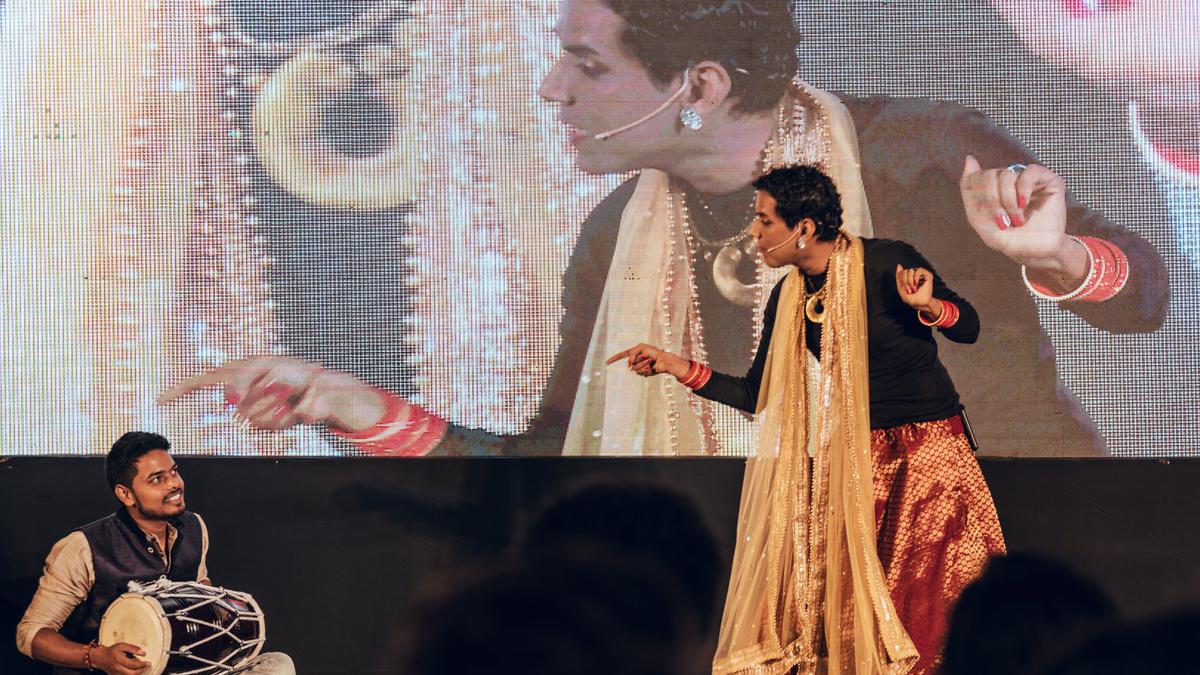
A “queer and inclusive” space of their own | Third edition of Rainbow Literature Festival kicks off in New Delhi
The Hindu
For centuries, queer artists have been creating works about queer people, yet their works have been largely eclipsed in mainstream history. To address this, the Rainbow Literature Festival was set up in 2019, with a mandate to be “queer and inclusive”. This year, the third edition of the festival will be held in Delhi’s Gulmohar Park Club, featuring a line-up of speakers, panellists and moderators. The festival is a space for queer people to meet, discover resources, and exchange ideas without fear of judgement. It also serves as a platform for emerging queer artists to share their stories. Funding is a challenge, but the festival is a testament to the growing acceptance of queer people in society.
Queer artists have existed across time, and so has art about queer people; from Ismat Chughtai’s 1942 short story ‘Lihaaf’, Bhupen Khakhar’s ‘Two Men in Benares’ and ‘Yayati’, to Prem Kapoor’s 1971 film Badnam Basti. Most of these artists were censured by society for ‘indecent’ portrayals, and their works, somehow, eclipsed in mainstream history. When included, references to them tended to be tokenistic rather than substantial.
This was one of the reasons author and journalist Sharif D. Rangnekar set up the Rainbow Literature Festival in 2019, to spotlight literature and ideas of, for, and by the queer community, with a mandate to be “queer and inclusive”. “I had a sense that we needed a space of our own, where we could discuss things around gender, sexuality, society, choice, war, love, education, healthcare and of course, literature itself,” says Rangnekar.
This year, the third edition of the festival, to be held December 9-10 at Delhi’s Gulmohar Park Club, features a formidable line-up that includes, among others, lawyers Saurabh Kirpal and Rohin Bhatt talking about ‘Sex, love and the law’; artist Hoshang Merchant on ‘A Life of Queerness’; actor Kalki Koechlin in conversation with Puja Talwar on ‘A Like Like No Other’, and a panel on ‘Feminism and Queerness’ with author-activist Urvashi Butalia, actor Mona Ambegaonkar, director Alankrita Shrivastava, among others.
Many have had similar ideas — of using arts and culture as a way of bolstering the LGBTQIA+ community, and this has given way to spaces like the KASHISH International Queer Film Festival in Mumbai, Chennai’s Queer LitFest, the Awadh Queer Literature Festival, DIALOGUES: Calcutta International LGBTQIA+ Film and Video Festival, and many more. Some of these spaces have existed for years, others have come up more recently, particularly after the Supreme Court struck down Section 377 in 2018.
The ostensible purpose of such spaces is, of course, promoting queer art and artists, but it inevitably ends up being more than that. It’s in these segregated, curated pockets that communities are built: queer people meet other queer people and allies, discover community groups that offer much-needed help and resources, and more than anything, indulge in unfiltered discussions and exchange of ideas, without constantly hedging whether people will ‘get it’.
According to L. Ramakrishnan, a public health professional with Chennai-based SAATHII, an NGO working for inclusive healthcare, legal and social services, particularly for queer and other marginalised communities, the last few years have seen a proliferation of queer voices and groups on social media. “But for a lot of queer people, their entire sense of community is derived from the online space. They don’t have any contact with on-the-ground community spaces and groups, which can have devastating consequences,” he says.
Last month, a 16-year-old queer make-up artist, Pranshu, died by suicide in Ujjain after facing online bullying. In light of this, and to create awareness of queer support groups and resources available, the importance of physical spaces cannot be overstated. Dr. Ramakrishnan is scheduled to speak at this year’s Rainbow Lit Fest, where he will be part of a panel on ‘Desire, Discrimination and the Queer Journey’, moderated by author and journalist Sandip Roy.





















 Run 3 Space | Play Space Running Game
Run 3 Space | Play Space Running Game Traffic Jam 3D | Online Racing Game
Traffic Jam 3D | Online Racing Game Duck Hunt | Play Old Classic Game
Duck Hunt | Play Old Classic Game











